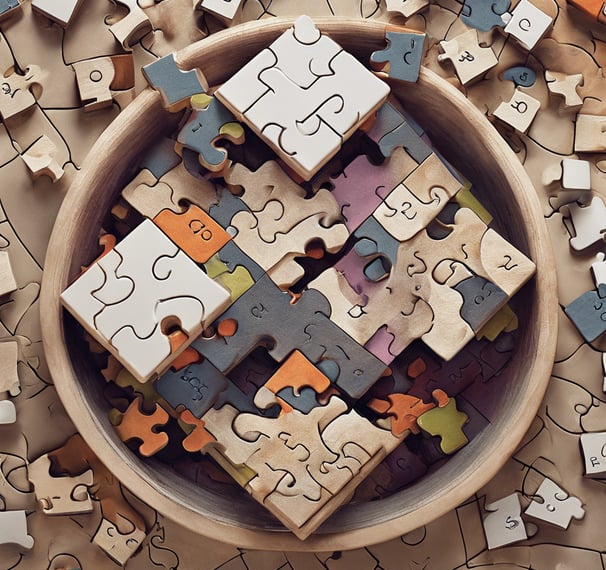The Benefits of Playing Puzzles : Training Your Responsiveness and Brain Intelligence
Playing puzzles not only offers entertainment but also numerous benefits for brain development. From enhancing concentration to boosting responsiveness, puzzles are effective tools for cognitive skills training. This article explores the various benefits you can gain from playing puzzles and why you should consider incorporating them into your daily routine.
MENTAL HEALTHPUZZLESPUZZLE BENEFITS BRAIN DEVELOPMENT
11/9/20243 min read


History and Development of Puzzles
Before delving into their benefits, let's take a brief look at the history of puzzles. The first puzzle was created in the 1760s by John Spilsbury, a London-based cartographer and engraver. He invented the first “jigsaw puzzle” by cutting a map of the world into pieces to help children learn geography. Since then, puzzles have evolved in many forms and complexities, from crosswords in the late 19th century to modern digital puzzles accessible via smartphones.
5 Benefits of Puzzles for Brain Intelligence
Improving Concentration and Perseverance
Playing puzzles requires attention to every small element that contributes to the overall picture or solution. This process demands prolonged focus from the brain. The concentration and perseverance honed through puzzle-solving can be applied to many aspects of daily life, such as tasks that require deep attention or complex learning challenges.
Benefits for Children:
Enhancing Attention Span: Puzzles can help children who tend to lose focus quickly to stay engaged with one activity for a longer period. Over time, this builds perseverance and patience.
Boosting Academic Skills: Children accustomed to puzzles often demonstrate improved concentration at school, better understanding of complex material, and a more systematic approach to solving tasks.
Benefits for Adults:
Reducing Stress: Focusing on puzzles diverts attention from daily worries, providing a calming effect. This activity acts like a light form of meditation, where attention is concentrated on one simple task.
Sustaining Long-Term Focus: Adults, especially those working in fields requiring deep thought, may experience long-term focus benefits from regularly solving puzzles.
Enhancing Memory and Information Retention
Puzzles, whether crosswords, jigsaw puzzles, or other logic-based games, push the brain to work harder at remembering and organizing information. This involves short-term memory to recall previous steps and long-term memory to connect learned information.
Brain Stimulation for Memory Enhancement:
Strengthening Visual Memory: For example, jigsaw puzzles require the brain to remember visual details such as shapes, colors, and patterns, improving recognition and recall of similar elements in real life.
Building Associations and Connections: Playing word or symbol grouping puzzles also boosts the brain's ability to make connections and associations between different elements.
Benefits for Seniors:
Preventing Cognitive Decline: Puzzle-solving can help maintain mental sharpness and protect against diseases like dementia or Alzheimer’s. Puzzles force the brain to stay active and work on new information retention.
Developing Problem-Solving Skills
Puzzles are prime examples of problem-solving exercises that require step-by-step approaches and strong logic. Players must identify problems, form hypotheses, try different strategies, and evaluate results.
Critical and Strategic Thinking:
Training Analytical Thinking: Puzzles challenge players to break down challenges into smaller parts and devise the best solutions.
Facing Failures and Trying Again: Mistakes and setbacks are common when solving puzzles. This encourages players to keep trying new methods until finding the right solution, building mental resilience and perseverance.
Practical Benefits:
Adaptability Skills: Puzzles teach flexibility in thinking and adaptation when faced with difficult situations—valuable in both professional and personal life.
Fostering Creativity: Puzzles often require players to think outside the box, using their imagination to find unconventional solutions.
Boosting Visual and Spatial Skills
Spatial and visual skills are essential in various life areas, such as driving, navigation, art, and even scientific work. Puzzles that involve recognizing shapes, colors, and patterns stimulate the brain's ability to comprehend space and interpret visual elements better.
Specific Benefits:
Improved Visual Perception: Puzzles help enhance sensitivity in recognizing differences and similarities between elements, crucial for designers, artists, or anyone working with visual details.
Mastering Geometric Concepts: Arranging elements based on shapes and angles helps develop practical geometry skills useful for mathematical problem-solving.
Real-Life Applications:
Navigation and Spatial Orientation: Frequent puzzle solvers often excel in reading maps, identifying directions, and understanding the relationships between different locations.
Sharpening Responsiveness and Mental Reflexes
Puzzles that involve time-based challenges, memory games, or interactive puzzles push the brain to work quickly and deliver accurate responses. This helps enhance mental reflexes and accelerate reaction times to new situations.
Key Benefits:
Faster Thinking: In a fast-paced world, the ability to think quickly and make sound decisions is crucial. Puzzles train the brain to respond swiftly and logically to challenges.
Balancing Left and Right Brain Functions: Puzzles stimulate the use of both the right brain (creativity and visualization) and the left brain (logic and analysis), resulting in cognitive balance.
Real-Life Applications:
Enhanced Reflexes: Quick responses during puzzles translate into real-life situations, such as making crucial work decisions or taking immediate actions during emergencies.
Playing puzzles is not just a way to pass the time; it is a valuable investment for brain health and cognitive development. With a variety of benefits, from increased concentration to enhanced problem-solving skills, puzzles are effective tools to maintain and improve brain function. Choosing the right type of puzzle and playing regularly can maximize these benefits.
Practical Recommendations:
Start with simple puzzles and gradually increase the difficulty.
Make puzzles part of your daily routine.
Vary puzzle types to train different cognitive aspects.
Play with family or friends.
Set goals and track your progress.
By understanding and leveraging the many benefits of puzzles, you can optimize brain function and maintain cognitive health in the long term. Start today and challenge yourself with interactive puzzles to enhance your thinking abilities in here or explore the ones suitable for adults.
